Blog
-

Blog / Editor's Choice
Move Fast and Break Things: How Facebook, Google, and Amazon Cornered Culture and Undermined Democracy
Book Review by Porchlight
Jonathan Taplin's new book asks us to reconsider the virtues and values of the digital economy, and how we can rebuild it on more decentralized, democratic values.
Categories: editors-choice
-

Blog / Excerpts
The Leader's Bookshelf
By Porchlight
If you think you have read a lot for your job, let me introduce you to the bookshelf of General James Mattis.
Categories: excerpts, narrative-biography
-

Blog / Interviews
A Q&A with Sheryl Sandberg and Adam Grant about Option B: Facing Adversity, Building Resilience, and Finding Joy
By Sally Haldorson
Our General Manager, Sally Haldorson, recently sent Sheryl Sandberg and Adam Grant five carefully considered questions about their new book. They responded in kind.
Categories: interviews, narrative-biography
-
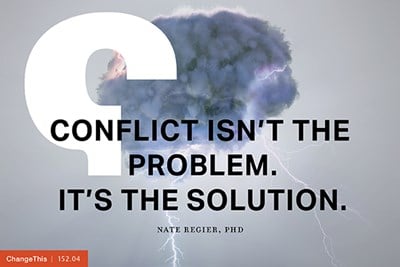
Blog / ChangeThis
Conflict Isn't The Problem. It's The Solution.
By Porchlight
"It's not surprising that when I Google the word 'conflict,' the terms 'resolution,' 'mediation,' 'management,' and 'reduction' pop up. All of these words convey an important message about our association with conflict; that it needs to be managed, reduced, resolved and mediated. The problem with conflict mediation, conflict management, and conflict reduction is that each one positions conflict as the culprit. Whether intended or not, these labels and much of the methods used in the conflict and communication fields reinforce the misconception that if we can remove the conflict, things will be better. When we mediate, manage, or reduce the conflict, we necessarily reduce the energy available for productive problem-solving. When we respect the tension and use that energy to create instead of destroy, the results can be transformative."
Categories: changethis
-
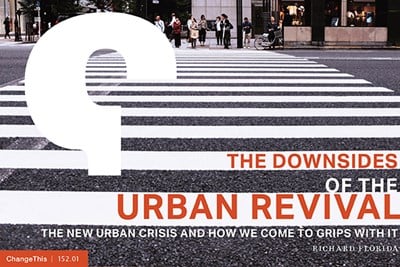
Blog / ChangeThis
The Downsides of the Urban Revival: The New Urban Crisis and How We Come to Grips With It
By Richard Florida
"In little more than a decade, the revitalization of our cities and our urban areas that I had predicted was giving rise to rampant gentrification and unaffordability, driving deep wedges between affluent newcomers and struggling longtime residents. What troubled me most of all was the decline of the great middle-class neighborhoods that had formed the backbones of our cities and broader society for most of my life. This was the kind of neighborhood I'd been born into, in Newark, and grown up in, in North Arlington. This was the kind of neighborhood I had hoped the new creative class was bringing back to our cities. But now, these once sturdy middle-class neighborhoods were disappearing right before my eyes. I entered into a period of rethinking and introspection, of personal and intellectual transformation, of which this book is the result. I began to see the back-to-the-city movement as something that conferred a disproportionate share of its benefits on a small group of places and people.
Categories: changethis
-
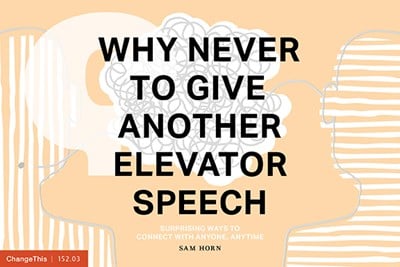
Blog / ChangeThis
Why NEVER to Give Another Elevator Speech: Surprising Ways to Connect with Anyone, Anytime
By Sam Horn
"Never again give an elevator SPEECH. Never again explain what you do and/or what you're trying to get a YES to. Never again 'Tell people what you're going to tell them.'
Categories: changethis
-
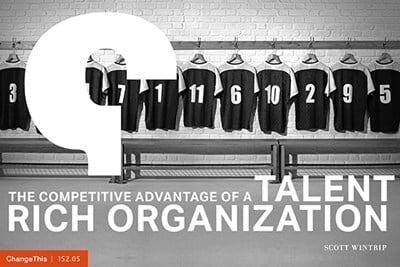
Blog / ChangeThis
The Competitive Advantage of a Talent Rich Organization
By Scott Wintrip
"When it comes to success in business, one measure alone can accurately predict the future—wealth of talent. The more talent wealth an organization has, the more successful that organization will be. We've all experienced the benefits of organizations that are rich in talent. These are the companies we've come to love. When we say we love a company, what we're really saying is we love the work being done by the exceptional people in these organizations. People are the reason why Apple, Alphabet (Google), Amazon.com, and Starbucks remain some of the world's most admired companies. That's why having a wealth of talent is so important for all organizations. Talented employees who do outstanding work are the secret ingredients that make their companies great."
Categories: changethis
-
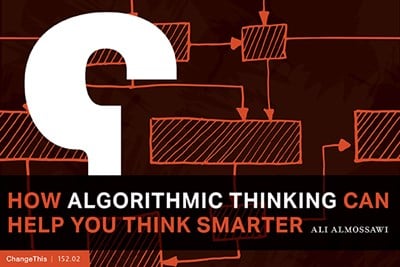
Blog / ChangeThis
How Algorithmic Thinking Can Help You Think Smarter
By Ali Almossawi
"What's fascinating is that Babylonian tablets from the second millennium BCE reveal that ancient Babylonians wrote down their procedures for determining things like, say, compound interest or the width and length of a cistern given its height and volume using algorithms. And all throughout history, and in a variety of domains, one can see approaches to problems that resemble what we refer to today as algorithms. That realization is intriguing for a number of reasons. One, it shows that this way of thinking about problems is rooted in ancient history. Two, it shows that it is domain-agnostic. And so, if one were to consider how best to make algorithms compelling to the broadest audience, it seems only natural to strive to not sell the field short, by describing it in its narrowest form, but to rather frame it as a tool for thinking, and a general-purpose one at that. One that can be applied to everyday problems that may have nothing at all to do with computers."
Categories: changethis
-

Blog / Excerpts
The Great Questions of Tomorrow: The Ideas that Will Remake the World
By Porchlight
David Rothkopf's new book confronts profound questions about the nature of disruption on human behavior, creativity, economic activity, and human understanding that our shaping our collective future.
Categories: excerpts
-
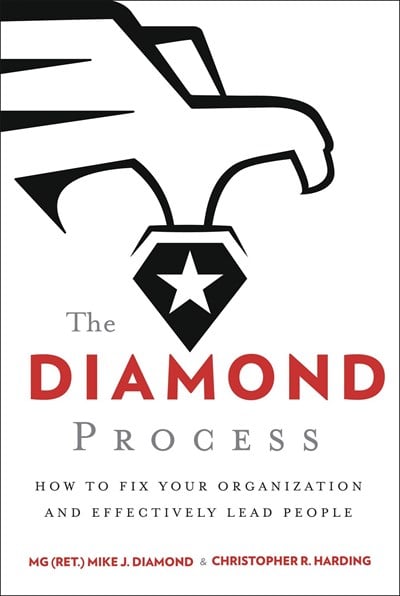
Blog / Book Giveaways
The Diamond Process: How to Fix Your Organization and Effectively Lead People
By Porchlight
Mike Diamond and Chris Harding have written a book about the importance of developing and leading process as well as people.
Categories: giveaways


